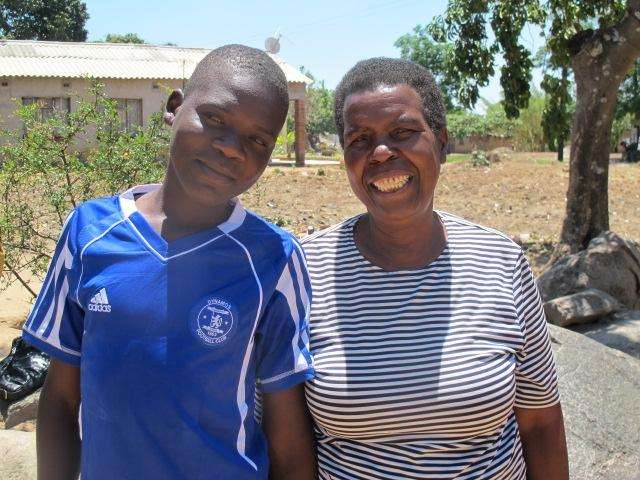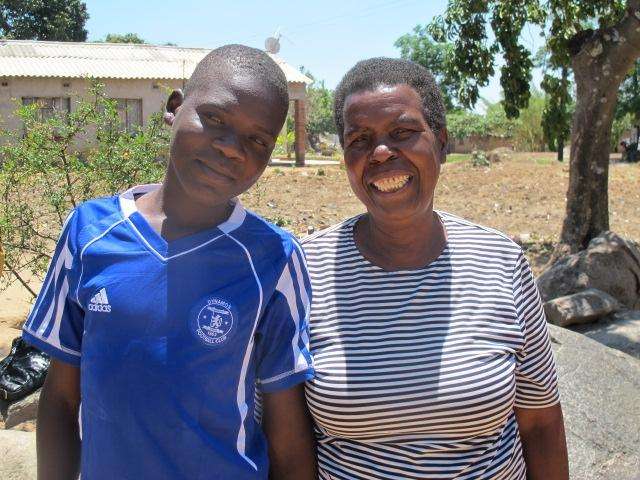When he was 14, Gibson Chijaka, an orphan living in Epworth, on the outskirts of the Zimbabwean capital of Harare, was diagnosed with drug-resistant tuberculosis (DR-TB). It was fortunate that it was detected early on and that he began treatment promptly, but his guardians thought it was his death knell. Given all the terrifying stories they'd heard about the disease, they couldn't have imagined the day would come when Gibson would be declared cured.
It required two years of grueling treatment that included eight months of daily injections and a slew of nausea-inducing medications, but Gibson is now, in fact, TB-free.
“I am so happy and cannot hold back my joy,” says an elated Gibson. “The last two years have been the most painful in my life. First being diagnosed with DR-TB at the age of 14 was not easy for me. People would ask what type of TB I had that needs injections every day for eight months. Some would even ask what type of TB is it that needs 18 tablets every day for two years. This is in addition to the anti-retroviral drugs I am taking.”
Being diagnosed with DR-TB was a double tragedy for Gibson, as he had to deal with both the stigma and the agonizing medication. Due to a lack of information, DR-TB is still stigmatized in many communities across Zimbabwe, and the stigmatization in turn helps spread the disease, because people are afraid to come forward and seek care.
“My daughter who was looking after Gibson was evicted at three different houses where she was renting, as the other tenants felt vulnerable to the communicable DR-TB,” said Margaret Kadzere, Gibson’s grandmother, who is staying with 21 other family members at her house. “I had to summon all my courage to defy negative talk and took him into care, as he had nowhere to stay. But then, deep inside, I was not sure if it was a good decision. I was afraid that he might spread the TB to other family members, though I did not show it to him. As a result, we were discriminated [against] in the community.”
She and other family members confessed that their worries were only eased after health education sessions with Doctors Without Borders/ Médecins Sans Frontières (MSF) health staff at Domboramwari Poly Clinic, where Gibson was treated. His relatives never thought that he would last the two-year treatment. Their worst fear was whether he would be cured of DR-TB, since he had already received many TB treatments in the past without any success.
“We had given up on Gibson and he was bed ridden," remembers Linnet Kadzere, Gibson's sister-in-law. "At one point we even wondered if the MSF people were sincere in trying to save his life or they just wanted to experiment with their drugs, as there seemed to be no life in him. But the health lessons they gave us reshaped our thinking and we turned this fear into courage as we were now determined to prove that these drugs really work, despite the stigma.”
Gibson is one of the many patients who has been diagnosed, treated, and cured of DR-TB. Just last year, 63 DR-TB patients were taken into care in MSF projects across Zimbabwe.
Eight patients have been treated and cured of DR-TB since the inception of the Epworth project in 2010. The program aims to implement a community-based DR-TB program while supporting the national TB program in DR-TB management.
“HIV weakens people’s immune system and the virus opens the door to opportunistic infections like TB,” says Dr. Dorly Legrand, who is responsible for the Epworth project TB program. “DR-TB is an epidemic that requires a new strategy, new tools, new drugs, and new public health approaches. The positive thing is that we are now proactively looking for DR-TB, hence the increase in cases we are detecting.”
A volunteer community health worker, Violet Bvute, who was visiting Gibson on a daily basis to ensure that he didn’t default on his treatment, felt that the duration of the medication discouraged people to be tested for DR-TB.
“Gibson had a strong will to live," said Bvute. "Despite his complaints of the drugs' side effects, he never defaulted taking his tablets for two years. I think the pill burden is one of the factors that demotivates DR-TB patients."
The approach is slightly different in a rural setting. In Tsholotsho district, for example, MSF employs a patient-centered, decentralized, and community-based model of care. After confirmation of diagnosis, a home visit is made for each case for contact tracing, during which MSF staff look at infection prevention and control assessment, determine distance to the nearest health facility, identify the treatment supporter, and assess other the living conditions.
National protocol in Zimbabwe now recommends that every HIV patient with a suspected cough be screened for TB using a GeneXpert machine, which is a new rapid molecular test that not only speeds up diagnosis, but also screens for drug-resistant TB and improves TB detection among people who have falsely tested negative through sputum smear. A prevalence study by health authorities to appreciate the burden of DR-TB in Zimbabwe is ongoing. The growing use of a new tool for rapidly diagnosing MDR-TB is helping identify more and more patients.
Gibson, now 16 years old, won the battle against DR-TB, but lost two years of school, as the schedule for his medication clashed with his school timetable.
“While I am grateful that the drugs have kept me alive, it was like going through hell for me so that I could enjoy this life," says Gibson. "I don’t think it has to be so painful for one to be cured of DR-TB. If only I had an opportunity to talk to those who make these drugs, my appeal would be: Please, can’t you just combine all these 18 tablets I was taking every day into one? And why not make it powerful so that I don’t have to endure two years taking them every day? The shorter the [treatment] period the better. If the treatment period was shorter, maybe I would not have had to drop out of school for two years.”
MSF has been working in Zimbabwe since 2000. Gaps in treatment for HIV/AIDS and TB, including DR-TB, remain. The needs of children and teenagers are particularly overlooked. In 2013, 3,200 patients were under treatment for TB, 63 of which were for MDR-TB.





